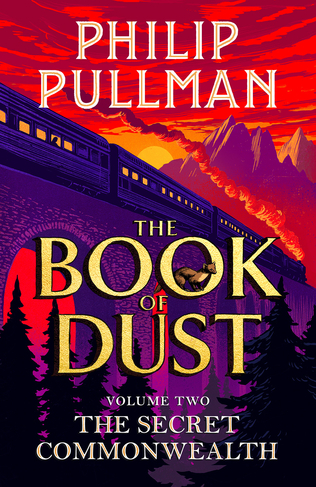Of Dust and Dragons


A double review of The Secret Commonwealth by Philip Pullman and Grendel by John Gardner
I really wanted to like Pullman’s latest addition to his Book of Dust trilogy (the follow-up series to ‘His Dark Materials’), because I love the original series, and I really enjoyed La Belle Sauvage. In that book we had tantalising glimpses of a magical counterworld to the one of Jordan College – itself a parallel or pocket-universe, similar to our world but with fascinating differences, not least the presence of daemons. Every human has one, and to be separated from one’s own is normally fatal. This new book pivots upon the premise that there are exceptions to this rule: Lyra, primarily, but others – as she discovers. These ‘untouchables’ are one of several kinds of ‘secret commonwealth’ in the book, but disappointingly, there is a telling absence of the magical reality glimpses in the first Book of Dust, apart from the odd fleeting glimpse of a will o’ the wisp. Witches are mentioned, but do not make a direct appearance. And the covetous fairy and the river-giant whose presence created an impressive shift of register (what I call ‘perilous amplification’) and mythic resonance, are sadly lacking. Considering Pullman has used the term coined by the Reverend Robert Kirk, and made famous in his 1691 monograph, ‘The Secret Commonwealth of Elves, Fauns, and Fairies’, there is little actual fairy folklore here, and no crossing over into this para-dimension hinted at previously. Frustratingly, at the very moment when a crossing of the threshold might occur, Pullman pulls the plug – ending the 2nd volume in a deeply unsatisfying place. The failure to deliver what the title clearly promises feels like a real missed opportunity. Instead, Pullman explores different kinds of secrets – which certainly provide numerous McGuffins for the characters to pursue – but it feels like the author has been reading too many spy novels, and this ‘Fantasy’ novel (which is how the series is marketed) works better on that level – albeit as ‘John Le Carré-lite’. Pullman is a craftsman and the prose rattles along – but it feels like the whole protracted nature of the project’s evolution (the author took over a decade to write it, famously vowing not to cut his hair until it was done) has led to tone seepage, with rather too much geopolitics and current affairs slipping (the migrant crisis in particular). It is admirable that Pullman wants to address these issues, but it feels like an incongruous direction for the sequence to go in. In the same way that he has felt behoven to include names of real people who have lost their lives in tragic ways – most notably a victim of the Grenfell Fire tragedy – this accretion of topicality and worthiness threatens to sabotage the whole project. There is a strong sense that Pullman is saving all of his best fireworks for the third and final volume – a big reunion with Will Parry and other characters from the first series perhaps? Unfortunately this feels suffers as a result. It seems to be mainly concerned with getting the key players from A to Z. Despite Pullman’s elegant prose, it suffers from mid-series bloat, and feels like an ageing Hrothgar, somewhat resting on his laurels as he reminisces about his glory days.
In comparison, John Gardner’s classic 1971 retelling of Beowulf from the perspective of Grendel, feels like the virile Geat-lander himself – swaggering into Heorot to set matters right in a world turn flabby and complacent. Eschewing the cliché of the doorstep Fantasy novel, it is far more Fantastic than many books that claim to be written within the genre. It shows a depth of imagination, and a delight of language which is often lacking in much modern writing. Gardner inhabitants the subaltern consciousness of the ultimate disenfranchised outsider with jaw-dropping briot. It is worth reading for the ‘performance’ of that extra-ordinary voice alone. Yet with fathomless invention Gardner cleverly weaves together a ‘prequel’ to the relatively familiar plot of Beowulf, taking us to same strange spaces – most memorably, to an encounter with the dragon which appears later in the classic poem. Gardner’s dragon is a worthy addition to the elite company of worms, dragons and serpents – pontificating philosophically like an old professor. Gardner plays with form – weaving in verse fit for the meadhall, script, parenthetical asides that break the fourth wall, and more. It is a tour-de-force of writing which is both playfully experimental and readable. Like the best kind of writing it feels transgressive – refusing to play it safe at any juncture. Like the eponymous anti-hero it tears down smug convention and challenges every false truth and cosily consoling fiction.
Clearly, Pullman is engaged in a very different project to Gardner – the latter is sui generis; the former part of an epic, and truly ambitious, Fantasy sequence (one that refuses to dumb down to its younger readers, or conform to its ostensible publishing pigeon-hole). Both aim high, and perhaps both succeed on their own terms: Gardner’s as a black swan one-off, and Pullman’s as part of the long-haul of his massive project. I am hopeful that the concluding volume of The Book of Dust instaurates the enchantment and vision of the earlier books, and that Pullman demonstrates the ‘fourfold vision’ of Blake he so eloquently talks about. Meanwhile, Kirk’s secret commonwealth awaits bolder explorers.
Kevan Manwaring, 10 December 2019



